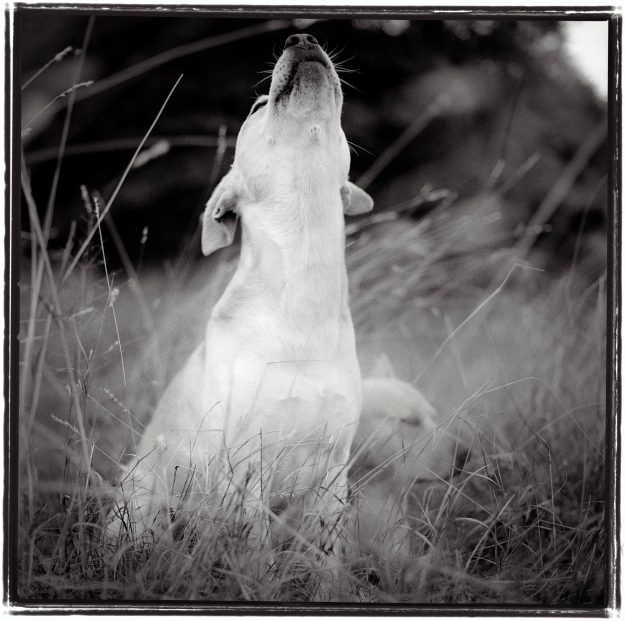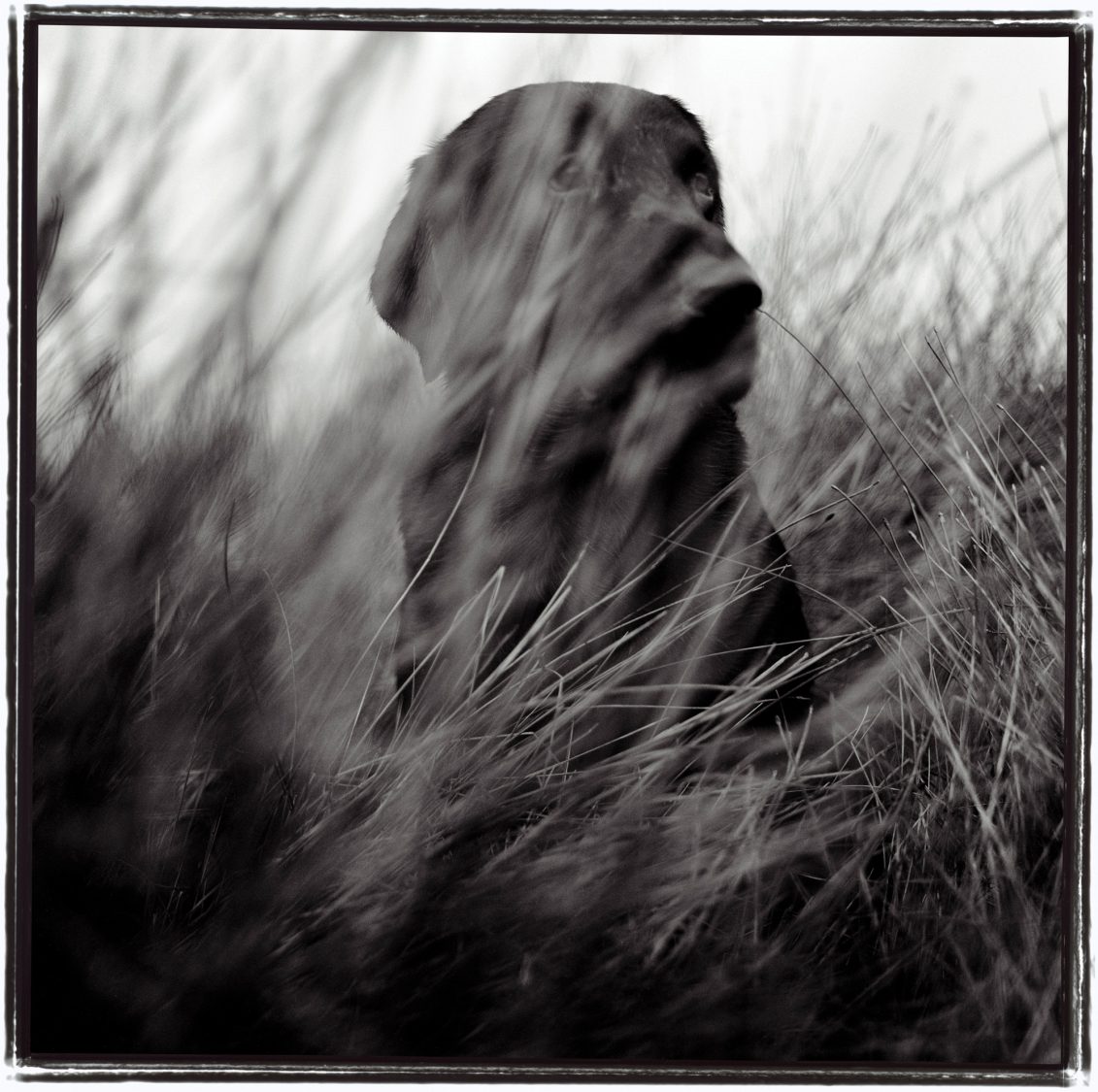My dog Widget was 7 when we adopted him from the shelter—a plain brown dog, a little underweight, silent and watchful. He is a quiet, unobtrusive dog, introverted, but disliking solitude. Sometimes he pushes gently at my hand for attention. For reassurance.
The vet and I have a talk. The same talk, again. We review the borderline liver failure, the declining kidney function, the bad digestion. How he drags a back foot sometimes, stops to lie down on the sidewalk halfway through a walk. I describe his nocturnal pacing, the hours of heavy panting. These are signs of pain in dogs, and the vet thinks Widget probably hurts most of the time now. He is on several strong medications.
“He’s a stoic fellow,” the vet says, leaning against the counter in his office. His kindness is impersonal; he sees this every day. “Dogs of this breed usually live about ten to twelve years,” he reminds me. “He’s, what, almost fourteen now? It’s time.”
I ask, not really expecting an answer, “Why won’t he just die of old age?”
The vet smiles. “People always ask that. It’s not going to happen. You have to make the decision.”
He isn’t talking about immortality. He’s talking about suffering.
We commit to not cause harm. To not kill. There are specific injunctions in the dharma about treating animals with lovingkindness. But there’s the rub: What is lovingkindness now? Which is the path of least suffering?
Related: Putting Spot Down
It was both harder and easier the last time. Ten years ago, our old golden retriever ruptured a spinal disc during the night. We woke to find him paralyzed from the chest down. We had no time to prepare, but it was also clear what we had to do: we carried him to the veterinarian’s office, and he was euthanized as we held him. Widget is dying by inches. The pacing and confusion aren’t constant; he has a good appetite. He still likes to walk, even when he sometimes falls along the way. He is surprised by his own weakness, as I can be. He seeks reassurance, as I sometimes do. This is the mystery of how a self unwinds.
Buddhism is a demanding moral practice; it turns over to each person the power to decide what is right to do in any given moment. Buddhist morality is not imposed by an outside authority. Our morality is imposed from within, from our felt sense of what is true. There is no single catechism. Rules for monastic behavior differ by tradition; the precepts for lay people vary in number. A quicksand of possibility—and volumes of near-rabbinical complexity explaining everything, full of self-contradictions.
Buddhism is a demanding moral practice; it turns over to each person the power to decide what is right to do in any given moment.
I have been a Soto Zen Buddhist for more than 35 years, and at times I have wished for the circumscription of clear rules. Much of the Vinaya can be measured: To close the robe up to the neck and down to the wrists when sitting in inhabited areas. Not to stand on tiptoes or on the heels within inhabited areas. Not to make—or have made, or use—beds or chairs of a height greater than 65 centimeters. But all Buddhists are stuck with the simplest directions: Not to lie. Not to steal. These are rather more difficult to measure.
A foundational precept like Do not kill confounds the practitioner the moment it is taken up. It is impossible to live without killing; we would have to stop digesting, walking, and breathing in order to fully keep this precept. (People have tried.) Plenty of Buddhists believe it means, in part, that one can never kill an animal deliberately. To kill a being is to interrupt its path, its karma; this is a serious act. Yet even the most severe practitioners allow a few exceptions when killing may be done—on the condition that one has only the purest and most selfless of intentions, free of malice and desire.
Well. I am not free of these things. I do not have entirely pure intentions. Influenced by Zen, I think in terms of volition, but also responsibility. However I act, I must accept that karmic consequences will follow and be willing to accept those consequences.What will be the results of any one act? I don’t know. I can’t know. I can only accept that karmic effects are many, enduring, and subtle.
We depend on our own felt sense of the truth. And we can spend a lifetime discovering it. A lifetime of considering our selfish, confused, and ignorant motives. The complexity of interrelationship that creates our lives. The consequences.
Our relationship to death and killing is a complicated one. Tell me that we should never interfere with a natural death, and I will tell you some of the many ways we interfere with it all the time. Without much effort, I can imagine situations in which I would kill a person. I voted to legalize assistance in dying in my state. I support reproductive rights, including the right to an abortion. I’m against the death penalty. My intent in each of these conditions is to reduce suffering. A person who holds the opposite views on every point will say the same thing.
And the choice is still right there. You have to make the decision.

How dare I determine the quality of his life? Widget is slow on his walks, but he relishes them. He stands beside my bed in the middle of the night, trembling all over. One day he falls halfway down the stairs, hind legs collapsing in a heap. Now I help him up the porch steps and carry him to the second floor, a task at the edge of my strength. According to traditional dharma, birth as an animal is lower than human birth. There are a lot of complex theological explanations for this, but largely it is because animals have less power, fewer opportunities for true self-governance. In this world of dukkha, or suffering, a life of less power is often a life of more suffering. Widget trusts me. Sometimes this fact looms over everything. What does he trust me to do? Does he trust me not to kill him? Or does he trust me to simply keep him from harm?
He stands in a corner, staring, shaking. I mix his pills in a little peanut butter several times a day. On some nights, I add a tranquilizer. He licks his back foot, over and over. I lift him in and out of the car. He lays his head in my lap, pushing at my hand.
I don’t describe this to convince anyone of anything. I am not trying to justify a choice. The choice is mine—that’s the point.The dharma gives us the burden—and the gift—of responsibility.
My childhood dog died at the age of 10 or so. He rarely saw a vet, and I can’t imagine anyone carrying him upstairs. My parents would have called this “letting nature take its course.” But nature hurts, and we are way past nature now. Widget is entering his fourteenth year because of vaccinations, a special diet, antibiotics, pain medications, and emergency surgery to remove an abscessed tooth. We are in this situation because I’ve taken such good care of him.
If we insist on waiting for the natural outcome, how can we justify having pets at all? Humans have deformed many species for our own needs; domestic dogs are a product of human intervention. To care for a domestic animal is to take on a strange responsibility. To then refuse to relieve an animal’s inevitable suffering is irresponsible in my view. Yes, nature is suffering. The world is dukkha, even as it is nirvana. Half of this world is pain. But the other half is sacrifice and caring and the willingness to do hard things for love.
Relentless honesty is part of our practice. I used the word euthanize earlier. It means mercy killing. I have never liked phrases like “put to sleep” or “put down.” When we euthanize our pets, we are killing them: deliberately, with intent. I would like to avoid engaging with this question at all, but I can’t.
I came across a teaching saying that you should ask an animal if it wants to die. I think Widget said yes recently. Yes to his irreplaceable life, and yes to the end of it.
Thank you for subscribing to Tricycle! As a nonprofit, we depend on readers like you to keep Buddhist teachings and practices widely available.
